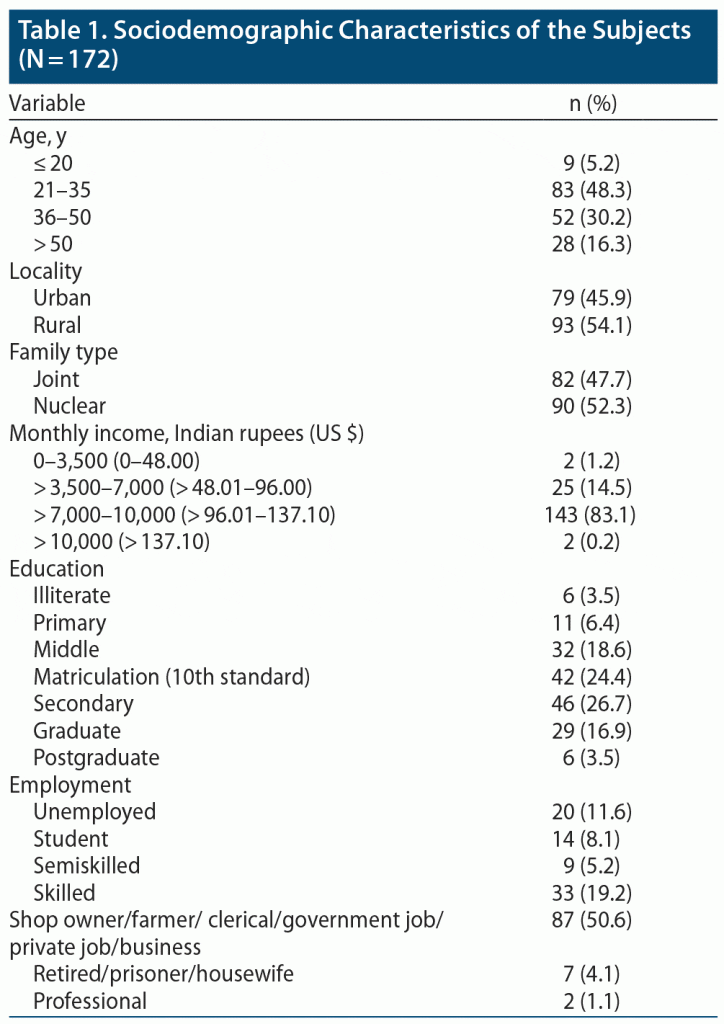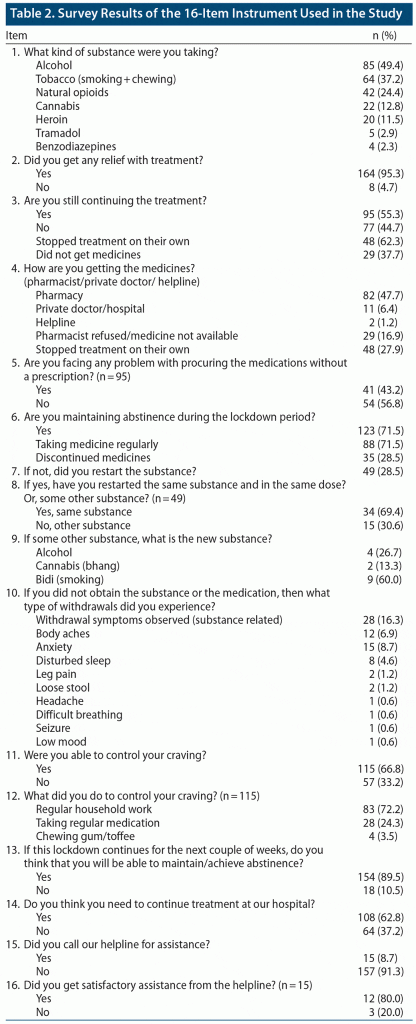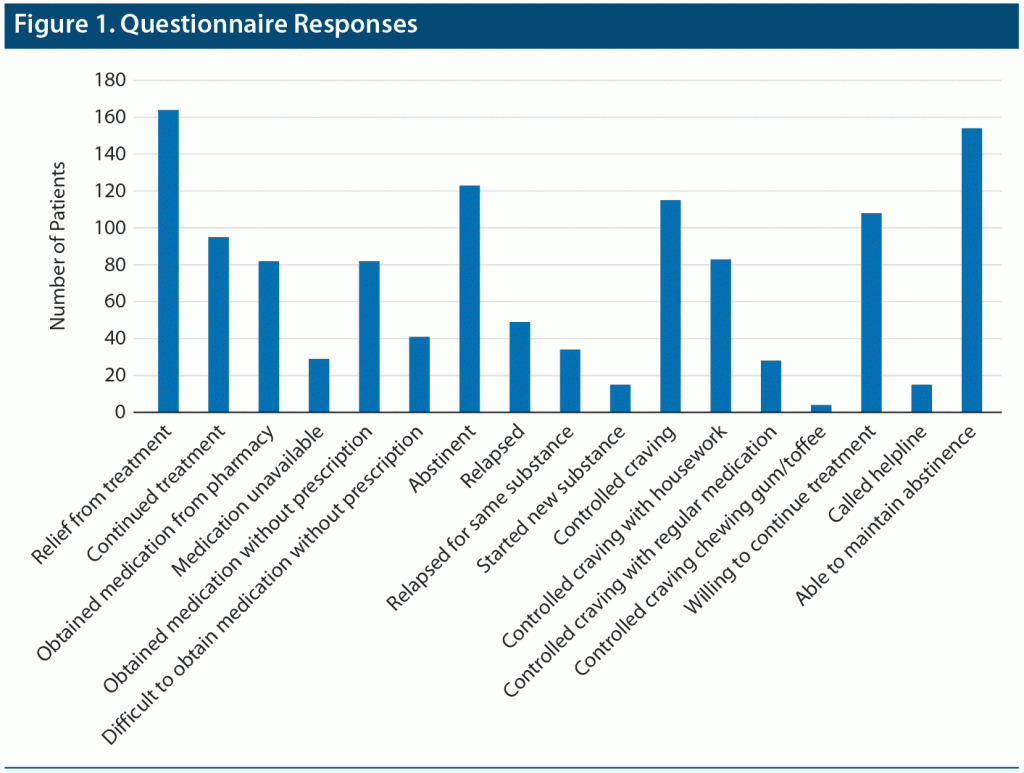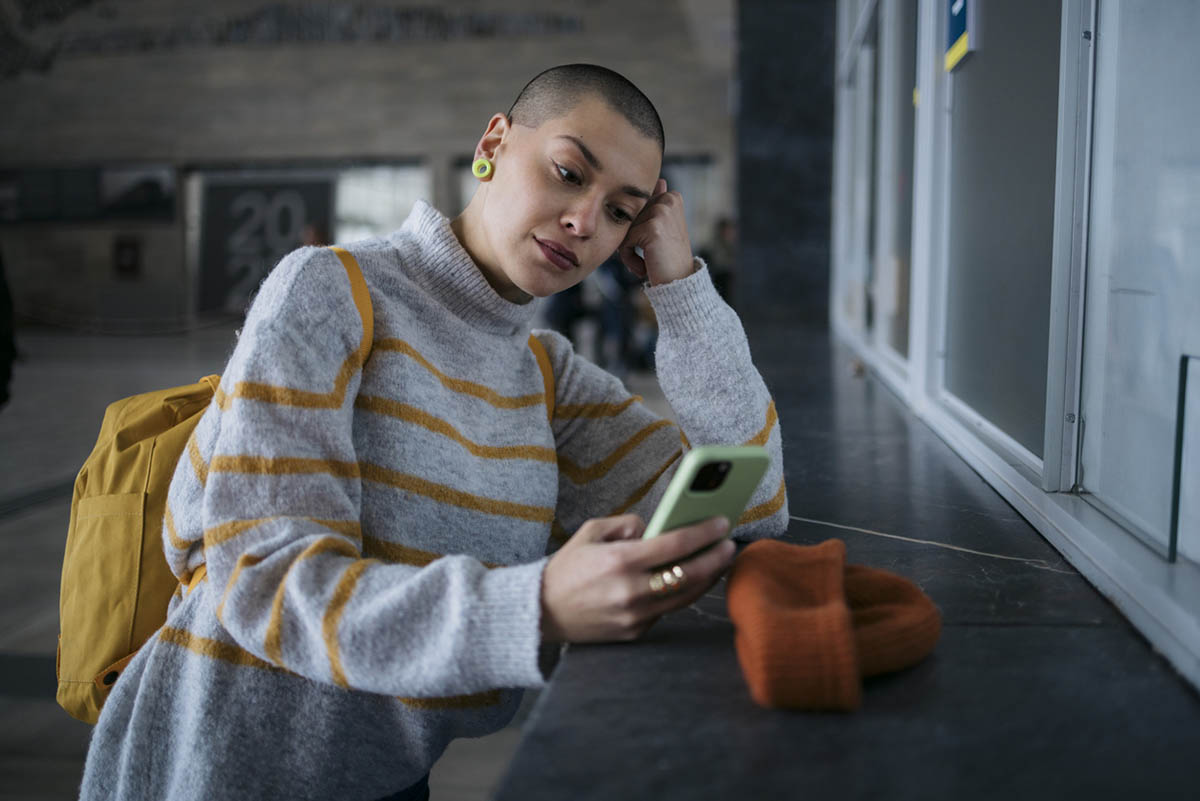ABSTRACT
Objective: Substance use disorder (SUD) is a chronic remitting and relapsing disorder, and abrupt discontinuation of the substance due to nonavailability in the absence of treatment precipitates withdrawals and craving. The objective of this study was to assess the craving and withdrawal coping mechanisms used by patients with SUDs as a result of disruption in availability of substances and medications due to sudden lockdown in response to coronavirus disease 2019.
Methods: A survey was administered via telephone from June 25, 2020, to July 15, 2020, to patients who had previously attended the substance use clinic of a tertiary care teaching hospital in North India from January 1, 2020, to March 21, 2020 (up to the time of lockdown). Sociodemographic and clinical details were obtained from case record files. A 16-item questionnaire was developed to collect information on coping with craving and withdrawal symptoms. A total of 215 patients were registered in the substance use clinic during this period for the treatment of SUDs, and of those, 43 could not be contacted due to various reasons such as wrong contact numbers, patient expired (not related to substance withdrawal), or not willing to talk. The mean age of the subjects was 37.05 (SD = 13.22) years, and men outnumbered women. The remaining 172 patients were contacted via telephone, and responses were gathered regarding withdrawal symptoms and coping with craving.
Results: More than two-thirds of the patients were still maintaining abstinence from their primary substance of abuse during lockdown. A large number of patients (n = 41, 43.2%) reported difficulty in obtaining prescribed medication for detoxification without renewal of their prescription. More than 66% of patients reported that they were able to control their craving, and many kept themselves busy with household activities.
Conclusions: The majority of patients who had completed the acute phase of withdrawals were able to maintain abstinence in the absence of renewal of prescribed medication and substance of abuse due to sudden disruption in supply. The patients were able to use certain strategies to control their craving.
Prim Care Companion CNS Disord 2021;23(2):20m02802
To cite: Sidana A, Chavan BS, Rohilla R, et al. Coping with craving and withdrawal due to substance use disorders during the COVID-19 lockdown. Prim Care Companion CNS Disord. 2021;23(2):20m02802.
To share: https://doi.org/10.4088/PCC.20m02802
© Copyright 2021 Physicians Postgraduate Press, Inc.
aDepartment of Psychiatry, Government Medical College and Hospital, Chandigarh, India
bDepartment of Community Medicine, Government Medical College and Hospital, Chandigarh, India
*Corresponding author: Ajeet Sidana, MD, Department of Psychiatry, Government Medical College and Hospital, Level-5, Block-D, Sector-32, Chandigarh 160030, India ([email protected]).
Substance use disorders (SUDs) are a major public health problem. A recent national survey1 in India showed that alcohol is the most common substance of abuse (14.6%), followed by cannabis, opioids, sedative-hypnotics, and inhalants. The Global Adults Tobacco Survey2 reported that 28.6% of all adults use tobacco (smoking and smokeless). SUD is a chronic remitting and relapsing illness and requires regular treatment and follow-up. Long-term use of psychoactive substances can lead to development of tolerance and dependence. The severity of dependence and withdrawals depends on the duration of intake, amount and frequency of substance use, and last dose of substance. The severity of withdrawals ranges from mild physical and psychological discomfort to very severe body aches, tremors, seizures, and delirium.3 Craving is a strong desire to use a substance repeatedly to cope with withdrawals and experience euphoria.4
Sudden cessation of substances of abuse with no medical help leads to a significant degree of withdrawal. Research5 from India reported increased cases of complicated alcohol withdrawals due to forced abstinence caused by the closure of licensed liquor stores during an election period. Generally, the majority of withdrawals subside within 7–10 days of last dose in the case of alcohol and 2–4 weeks in the case of opiate use. Abrupt disruption of supply of both licit and illicit substances in the absence of medical treatment can lead to significant withdrawals, craving, and relapse. Although, patients may be motivated to stop using the substance, they may try to cope with cravings through various psychological interventions and activities.
Coronavirus disease 2019 (COVID-19) has engulfed the world, and the number of cases and deaths are increasing daily. The first COVID-19 case in India was identified at the end of January 2020.6 The COVID-19–related lockdown of India, which started March 22, 2020, may have been very difficult for those in the early phase of treatment for SUDs, as there was a curfew throughout the country and a sudden reduction in the supply of licit and illicit substances. There was also closure of outpatient department services in all the major hospitals. Thus, the objective of this study was to evaluate the status of patients with SUDs who were already registered with our department. The primary aim was to assess their current status of substance use and determine the coping strategies used by patients to deal with withdrawals and craving during lockdown.
METHODS
A survey was administered via telephone from June 25, 2020, to July 15, 2020, to patients who had previously attended the substance use clinic of a tertiary care teaching hospital in North India (from January 1, 2020, to March 21, 2020). Consent was obtained from respondents at the beginning of the interview, and the study was approved by the hospital’s institutional research and ethics committee.
Sample Selection and Subject Details
The case record files of patients with SUDs diagnosed per ICD-107 criteria, who were seen in the substance use clinic from January 1, 2020, to March 21, 2020 were retrieved and analyzed for sociodemographic and clinical details. The sociodemographic variables included age, sex, contact details, locality, family type, income, education, and employment. The clinical variables included ICD-10 diagnosis of SUD, last use, and last visit to the outpatient department. Forty-three patients could not be contacted due to various reasons such as wrong contact numbers (n = 30), patient expired (n = 4, not related to substance withdrawals), and not willing to participate (n = 9). Thus, the final sample included 172 patients.
More than half (53.5%) of the patients were aged < 35 years with an overall mean age of 37.05 years (SD = 13.22 years). Patients from a rural locality (54.1%) and nuclear families (52.3%) predominated the sample. Almost all patients had a monthly income < 10,000 Indian rupees (< US $137.10). Nearly 20% of patients were college graduates or above, whereas unemployed and students comprised 11.6% and 8.1% of the sample, respectively (Table 1).
Development of the Survey Instrument
Since there was no tool to assess craving and withdrawal due to sudden lockdown, the authors developed a questionnaire to study the current status of substance use, withdrawal symptoms, and coping with craving. The questionnaire was developed by 3 mental health professionals with more than 20 years of experience in the field of SUDs. The questions were taken from the available instruments on craving and withdrawal. The feasibility was assessed with 5 subjects in a pilot study. The initial questionnaire had 20 items. Four items were deleted after feedback from another expert in the field, as they overlapped with other questions. The final questionnaire consisted of 16 items and was translated into Hindi and vernacular language. Research staff with master’s degrees in social work and 15 years of experience in SUDs approached the patients and explained the purpose of the survey. An appointment was made with the patient to conduct the interview and administer the 16-item questionnaire.
RESULTS
Results of the survey are included in Table 2. Of the 172 respondents, only 5 (2.9%) were female. Alcohol was the most common substance of abuse (n = 85, 49.4%), followed by tobacco (smoking and smokeless, n = 67, 37.2%), natural opioids (n = 42, 24.4%), cannabis (n = 22, 12.8%), heroin (n = 20, 11.5%), tramadol (n = 5, 2.9%), benzodiazepines (n = 4, 2.3%), and multiple substance abuse. Regarding pattern of substance use, 109 patients were using a single substance, 50 were using 2 substances, and 13 were using ≥ 3 substances.
Status at Last Outpatient Department Follow-Up Visit
As part of standard follow-up notes in the case records, craving is recorded per the self-report of the patient. Craving is rated as (1) no craving or very minimal craving that can be managed by the patient with no difficulty (noted as +), (2) significant craving (moderate craving) that leads to intermittent substance use (noted as ++), and (3) severe craving that causes more frequent substance use and dysfunction (noted as +++). Intermittent substance use was defined as use of substance on at least 1 to 2 occasions during the last week.
At the last follow-up before the lockdown, of 172 patients, 17 (9.9%) were unable to quit the substance and had significant craving, although they did have motivation to stop using the substance and were compliant with medications. Nineteen (11.0%) patients were still using the substance and also had poor motivation and irregular treatment compliance. Twenty-five (14.5%) patients were using the substance intermittently and complaining of withdrawals and craving. Overall, 111 (64.5%) patients were maintaining abstinence, compliant with medications, reported feeling better at the time of their last visit to the outpatient department, and denied craving for the substance. However, 61 (33.5%) patients were still using the substance and having withdrawals and craving at the time of their last visit before the lockdown.
During the lockdown, 95 (55.3%) patients were still continuing the same treatment as at the time of last follow-up, and 77 (44.7%) patients discontinued the treatment (48 stopped treatment on their own and 29 did not obtain medications). When asked about procurement of medications during the lockdown, 82 (47.7%) patients were able to procure the prescribed medications easily from the pharmacy, whereas 29 (16.9%) reported that medications were not available or that the pharmacist refused to dispense the medicine. Regarding problems related to procuring the medications without a prescription, of 95 respondents, 41 (43.2%) encountered resistance; however, they were able to convince the pharmacist to dispense medications for 1 to 2 weeks.
More than two-thirds of the patients, ie, 123 (71.5%), were still able to maintain abstinence during the lockdown period, of which 88 were taking medications regularly and 35 discontinued the medications. Forty-nine (28.5%) patients could not maintain abstinence and restarted using substances. Of these 49 patients, 24 were intermittent/occasional users, whereas the remaining 25 started using the substance on a regular basis as shown in Table 3.
Of these 49 patients, 34 (69.4%) started using the same substance, whereas 15 (30.6%) shifted to new substances such as alcohol, bhang, and bidi. The most common sources of substance procurement were friends and relatives, homemade alcohol, old stock of substance, and from the home of local/desi liquor vendor. Withdrawal symptoms were reported by 28 (16.3%) patients who were unable to obtain the substance or medication, of which the most common were anxiety (8.7%), body aches (6.9%), and sleep disturbance (4.6%).
A total of 115 (66.8%) patients were able to control their craving. Of those patients, 83 (72.2%) reported that they pass their time and control craving by watching TV, doing regular household work (cooking/cutting vegetables, house cleaning), engaging in harvesting work, reading newspapers, gardening, or yoga in addition to regular medication. Twenty-eight (24.3%) patients were able to control craving by taking regular medications only and 4 (3.5%) patients by chewing gum/toffee as shown in Figure 1.
Nearly two-thirds of the patients (108, 62.8%) were willing to continue treatment with the hospital after the lockdown ended, as they felt that their treatment was still incomplete. Fifteen (8.7%) patients called the dedicated mental health toll-free helpline, and 12 (80.0%) received satisfactory help. Of the respondents, 154 (89.5%) believed that they would be able to maintain/achieve abstinence if the lockdown was extended.
DISCUSSION
The current study focuses on coping with craving and withdrawals by patients with SUDs during imposition of sudden lockdown amid the COVID-19 pandemic.
Since all the patients were enrolled in our clinic approximately 10 weeks before the sudden lockdown and all of their withdrawal symptoms had not subsided, 172 patients were receiving pharmacologic treatment and counseling at the time of last follow-up before the lockdown. Since, the lockdown was announced suddenly, there was no time for the treating doctors and patients to prepare for a future course of action. Because, the treating clinicians had never faced such an unprecedented situation, it was unclear how their patients would cope with the persistent withdrawal and craving due to sudden stoppage of treatment. Hence, the present study was conducted to assess the coping mechanisms that patients use to deal with craving and withdrawal.
When the study was planned, the authors had a general feeling that a large number of patients might have relapsed due to nonavailability of medication, as there was a curfew in the city. This belief was based on their earlier treatment experiences with these patients. Whenever, medications from the hospital pharmacy were unavailable or an appointment was missed, many patients would consume the substance to combat their withdrawal and craving.
The findings of the current study show that the majority of patients in the study were male, in the age range of 21–35 years, married, educated up to the 10th/12th class, and employed. Alcohol, tobacco, and opiates were the most common substances of abuse, which is in concordance with other studies8 on the profile of treatment seekers from the same center.
The findings of the present study came as a surprise for the authors. Just before the lockdown, 64.5% of the patients were abstinent from the primary substance, although they were receiving some medication including hypnotics, pain killers, and anticraving drugs. Eight weeks after the lockdown, the abstinence rate increased to 71.5% despite that 77 patients (44.7%) discontinued the medications, either on their own or because they were unavailable due to the lockdown and the pharmacist refused to dispense without a prescription. Further, the intermittent use of substances reduced from 14.5% to 13.9% and regular use reduced from 21.0% to 14.6%. The findings are based on self-report of the patient, and there were no objective parameters; however, studies9,10 have found that self-report is a reliable method to determine the status of substance abuse. The higher abstinence rate during lockdown could be due to various factors. First, the patients were already on treatment and severe withdrawals had already subsided. Second, patients were forced to stay indoors, thereby reducing their craving from external cues. Third, patients kept themselves engaged in alternative hobbies. Fourth, the substances were not easily available, and these patients might have decided to use this as a “golden opportunity” to give up their habit permanently. Fifth, they were under constant monitoring by the family as everyone was at home, which might have also ensured constant support by the family. We found no study on the positive outcome of abstinence due to sudden disruption of supply, but remission is an integral component of the natural history of substance abuse.11 Just over one-fourth of patients restarted the substance, and a small number of patients started a new substance, which is similar to findings in the literature.12
Among our patients, alcohol dependence was most common (49.4%), followed by tobacco (37.2%), opioids (24.4%), and multiple drug abuse (26.2%). Generally, the alcohol withdrawal lasts for 7–10 days; however, a large number of patients keep complaining of sleep disturbances, anxiety, and craving,13 and to avoid relapse, many patients continue taking benzodiazepines and anticraving medication.14 As reported in a previous study from the same center, a standard treatment protocol for patients with alcohol dependence includes benzodiazepines (lorazepam or oxazepam) for detoxification, simultaneously augmented with baclofen to reduce withdrawals and craving.15 On the other hand, opiate and multiple drug abuse withdrawal lasts much longer,16 and that is the reason that the majority of our patients were on medication even after 4–10 weeks of initiation of treatment.
Before the lockdown, 61 patients (33.5%) reported almost regular use of a substance along with prescribed medicines due to persistent withdrawals and craving, and, thus, a large number of our patients were receiving anticraving drugs. Craving is the most common cause of relapse3 and opioid dependence syndrome; naltrexone is the preferred choice for reduction of craving as reported by earlier research from our department.17 More than 66% of our patients were able to control their craving, and the most effective method was by keeping them engaged in household work (eg, cooking, cutting vegetables, house cleaning), harvesting, reading newspapers, gardening, yoga, or chewing gum/toffee. This is a unique finding of the study, as during the lockdown period, everyone was staying at home and even the part-time cooks and servants were not coming for work. Traditionally, in a typical Indian family, household work is the responsibility of the woman of the house, but during the lockdown they were assisted by the males, including patients with substance use disorders, during their leisure time, which might have reduced their craving. Research18,19 has shown that various kinds of aerobic exercise can reduce withdrawals and craving and increase the abstinence rate.
The biggest challenge during the lockdown was obtaining prescribed medicine as the pharmacies were allowed to open only for a fixed time during the first lockdown of 3 weeks and the second lockdown of another 3 weeks. Additionally, the outpatient department services of all 3 major hospitals were already closed and patients could not renew prescriptions. The present study found that more than 40% of patients either could not get the medications or received a smaller quantity after a lot of pleading with the pharmacist. Because of rampant use of prescription drugs (benzodiazepines, baclofen, tramadol, tapentadol, and loperamide), law enforcement agencies have become very strict with frequent raids on pharmacies, and, thus, prescribed drugs were not dispensed by pharmacists without renewal of prescription. However, the situation will vary from city to city. A study20 from Central Saudi Arabia reported that people easily procure psychotropic medicines without prescription. Another worry of clinicians was about the future treatment of patients as the curfew and lockdown were likely to remain in place for an uncertain period of time. Thus, patients were asked, “If this lockdown continues for the next couple of weeks, do you think that you will be able to maintain/achieve abstinence?” Approximately two-thirds of our patients stated that they would maintain abstinence in the event of further extension of lockdown, which is a satisfying outcome for not only patients and their families but also clinicians. This finding is contrary to that of another study21 that reported that closure of licensed liquor stores can lead to complicated alcohol withdrawals in patients.
The index study has a few limitations as no standardized tool was administered to assess the abstinence and craving status, no urine screening was performed to substantiate the abstinence status, and the information was gathered from patients predominately. Despite these limitations, the index study is the first of its kind to assess the effectiveness of various household activities in managing the withdrawals and craving in individuals with SUDs.
CONCLUSION
Results of the current study show that patients with SUDs who were already seeking treatment were able to maintain abstinence during the lockdown period in the absence of renewal of prescribed medication. The nonavailability of substances did not lead to complicated withdrawal reactions. The patients discovered alternative strategies to cope with craving and minor withdrawal symptoms.
Submitted: August 25, 2020; accepted November 5, 2020.
Published online: February 24, 2021.
Potential conflicts of interest: None.
Funding/support: None.
Clinical Points
- Patients with substance use disorders who have already completed or are in the process of detoxification can cope with craving and withdrawals in the event of sudden closure of a treatment facility.
- Engagement of patients with substance use disorders in various types of household activities may reduce cravings for substances.
References (21)

- Ambekar A, Agrawal A, Rao R, et al; on Behalf of the Group of Investigators for the National Survey on Extent and Pattern of Substance Use in India. Magnitude of Substance Use in India. New Delhi, India: Ministry of Social Justice and Empowerment, Government of India; 2019.
- GATS2–Global Adult Tobacco Survey Fact Sheet, India 2016–17. World Health Organization website. https://www.who.int/tobacco/surveillance/survey/gats/GATS_India_2016-17_FactSheet.pdf?ua=1. Accessed July 15, 2020.
- Becker HC. Alcohol dependence, withdrawal, and relapse. Alcohol Res Health. 2008;31(4):348–361. PubMed NLM
- Tiffany ST, Wray JM. The clinical significance of drug craving. Ann N Y Acad Sci. 2012;1248(1):1–17. PubMed CrossRef NLM
- Narasimha VL, Mukherjee D, Shukla L, et al. Election bans and alcohol banes: the impact of elections on treatment referrals at a tertiary addiction treatment facility in India. Asian J Psychiatr. 2018;38:27–28. PubMed CrossRef NLM
- Coronavirus Cases in India: State-wise break up of confirmed coronavirus cases. Accessed July 7, 2020. https://economictimes.indiatimes.com/news/politics-and nation/coronavirus-crisis-heres-total-number-of-confirmed-cases-in-india-as-per-health-ministry/articleshow/74589499.cms
- World Health Organization. International Statistical Classification of Disease and Related Health Problems, Tenth Revision (ICD-10). Geneva, Switzerland: World Health Organization. WHO; 1992.
- Sidana A, Chavan BS, Garg J. Pattern of substance use disorder among first time treatment seekers: a study from North India. Journal of Medical College Chandigarh. 2019;9(2):25–31.
- Colón HM, Robles RR, Sahai H. The validity of drug use self-reports among hard core drug users in a household survey in Puerto Rico: comparison of survey responses of cocaine and heroin use with hair tests. Drug Alcohol Depend. 2002;67(3):269–279. PubMed CrossRef PubMed CrossRef NLM
- Napper LE, Fisher DG, Johnson ME, et al. The reliability and validity of drug users’ self-reports of amphetamine use among primarily heroin and cocaine users. Addict Behav. 2010;35(4):350–354. PubMed CrossRef NLM
- Sarvet AL, Hasin D. The natural history of substance use disorders. Curr Opin Psychiatry. 2016;29(4):250–257. PubMed CrossRef NLM
- Kadam M, Sinha A, Nimkar S, et al. A comparative study of factors associated with relapse in alcohol dependence and opioid dependence. Indian J Psychol Med. 2017;39(5):627–633. PubMed CrossRef NLM
- Kattimani S, Bharadwaj B. Clinical management of alcohol withdrawal: a systematic review. Ind Psychiatry J. 2013;22(2):100–108. PubMed CrossRef NLM
- Schmitz A. Benzodiazepine use, misuse, and abuse: a review. Ment Health Clin. 2016;6(3):120–126. PubMed CrossRef NLM
- Gulati P, Chavan BS, Sidana A. Comparative efficacy of baclofen and lorazepam in the treatment of alcohol withdrawal syndrome. Indian J Psychiatry. 2019;61(1):60–64. PubMed NLM
- Drug Withdrawal Symptoms, Timelines, and Treatment. American Addiction Centers website. https://americanaddictioncenters.org/withdrawal-timelines-treatments. Accessed August 2, 2020.
- Sidana A, Das S, Bansal SP. Low-dose and high-dose naltrexone in opioid dependence syndrome: a three months outcome study. Open Journal of Psychiatry & Allied Sciences. 2019;10(2):151–154. CrossRef
- Wang D, Wang Y, Wang Y, et al. Impact of physical exercise on substance use disorders: a meta-analysis. PLoS One. 2014;9(10):e110728. PubMed CrossRef NLM
- Wang K, Luo J, Zhang T, et al. Effect of physical activity on drug craving of women with substance use disorder in compulsory isolation: mediating effect of internal inhibition. Front Psychol. 2019;10:1928. PubMed CrossRef NLM
- Alosaimi FD, Alruwais FS, Alanazi FA, et al. Patients reasons for obtaining psychotropic medications without a prescription at retail pharmacies in Central Saudi Arabia. Neurosciences (Riyadh). 2016;21(4):338–344. PubMed CrossRef NLM
- Arya S, Gupta R. COVID-19 outbreak: challenges for Addiction services in India. Asian J Psychiatr. 2020;51:102086. PubMed CrossRef NLM
Enjoy this premium PDF as part of your membership benefits!









